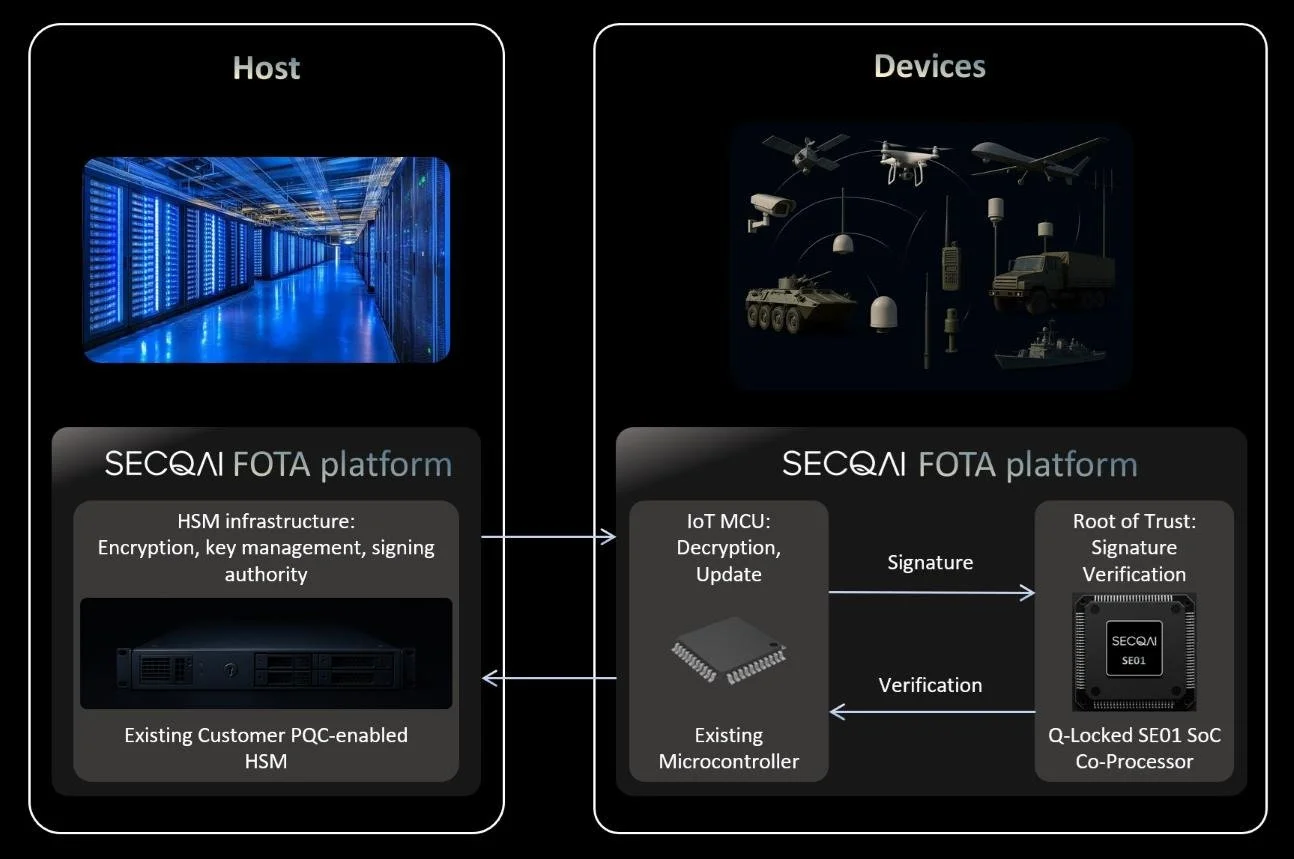SECQAI and global defence contractor demonstrate world’s first PQC in a FOTA process on a Memory Safe Chip
SECQAI is proud to announce its successful demonstration of PQC signing capabilities in a Firmware Over the Air update process with a global defence contractor, on its Q-Locked SE01 System on Chip, supported by NATO DIANA.
London, UK 26/11/2025 – SECQAI, a leading provider of ultra secure semiconductor solutions has successfully demonstrated Post-Quantum Cryptographic (PQC) Signing Capabilities for messaging and files in a Firmware Over The Air (FOTA) update process, powered by SECQAI’s CHERI ISA v9 SE01 System on Chip (SoC). This is a significant step towards making the world a safer and more secure place: it marks the world’s first deployment of PQC on a semiconductor device built using Secure by Design CHERI memory safety in a critical operational use case.
Protecting the FOTA process: of global significance
FOTA processes are critical enablers for the deployment of updates (e.g. firmware, OS, application or security) across distributed devices all around the world, at scale, for consumers and enterprise products. They are found across Critical National Infrastructure (e.g. energy grid smart meters and remote terminal units), vehicles (which have become software platforms) and the daily lives of our populations (smart devices, phones and laptops).
Quantum Computing poses an existential risk to the digital signature processes relied upon by FOTA processes, leading to technology companies pushing to adopt NIST compliant PQC across products and services.
Accelerating PQC across the FOTA process
SECQAI’s Q-Locked SE01 SoC accelerates FIPS 203, 204 and 205 algorithms at the hardware level to enable their efficient deployment from the data centre to the edge. These were benchmarked as software implementations for speed against other implementations of these NIST algorithms in hardware, with SECQAI’s secure implementation broadly matching them, but at higher security and lower power.
Working together with the global defence contractor, SECQAI successfully applied and demonstrated the FIPS 204 and 205 digital signature algorithms across differing security categories and verified them across a FOTA process using its Memory Safe SE01 Chipset.
“This achievement underscores our commitment to enabling our partners to meet tomorrow’s cybersecurity threats today," said Rahul Tyagi (CEO, SECQAI). "By collaborating with key customers, we are bringing to market silicon-validated, standards-aligned PQC that’s ready for deployment at scale."
This deployment was objectively validated using OpenSSL and built in a way that customers can easily switch in their own PQC approaches and deploy it as part of their existing FOTA toolchain.
Significantly, the SE01 device has been built to be memory safe, incorporating Capability Hardware Enhanced RISC Instructions (CHERI) on a RISC-V platform.
SECQAI’s Q-Locked SE01 System on Chip
SECQAI’s SE01 SoC is a secure microcontroller that can be used as a system’s Root of Trust and has implemented all FIPS PQC algorithms to support its customers in their transition to PQC. Optimized for PQC workloads, secure boot, firmware signing and credential management, its deployment of FreeRTOS in a memory safe setting drives the next generation of security across edge devices.
About SECQAI
SECQAI is a British semiconductor company focused on fixing today's and tomorrow's security vulnerabilities from the ground up. We enable the next generation of secure computing from the data center to the edge with our leading-edge products.
Visit: https://www.secqai.com
About NATO DIANA
DIANA is the Defence Innovation Accelerator for the North Atlantic, a NATO organisation with a mission to locate and accelerate dual-use innovation across the Alliance. DIANA provides technology developers with the resources, networks and expertise to address critical defence and security challenges, to create a more peaceful and resilient future.
Learn more at www.diana.nato.int

